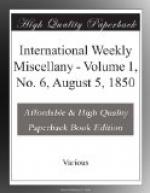Where was his wife? why did he never mention her? Giovanna continually asked herself these questions when they had departed.
A few nights after, the Count Leon arrived sad and thoughtful. He prevailed on Giovanna to sing one of her Polish melodies; which she told him had been taught, when a child, by her muse. Roszynski, unable to restrain the expression of an intense admiration he had long felt, frantically seized her hand, and exclaimed, “I love you!”
She withdrew it from his grasp, remained silent for a few minutes, and then said slowly, distinctly, and ironically, “But I do not love you, Count Roszynski.”
Leon rose from his seat. He pressed his hands to his brow, and was silent. Giovanna remained calm and tranquil. “It is a penalty from Heaven,” continued Leon, as if speaking to himself, “for not having fulfilled my duty as a husband toward one whom I chose voluntarily, but without reflection. I wronged her, and am punished.”
Giovanna turned her eyes upon him. Leon continued, “Young, and with a heart untouched, I married a princess about ten years older than myself, of eccentric habits and bad temper. She treated me as an inferior. She dissipated the fortune hoarded up with so much care by my parents, and yet was ashamed on account of my origin to be called by my name. Happily for me, she was fond of visiting and amusements. Otherwise, to escape from her, I might have become a gambler, or worse; but, to avoid meeting her, I remained at home—for there she seldom was. At first from ennui, but afterward from real delight in the occupation, I gave myself up to study. Reading formed my mind and heart. I became a changed being. Some months ago my father died, my sister went to Lithuania, whilst my mother, in her old age, and with her ideas, was quite incapable of understanding my sorrow. So when my wife went to the baths for the benefit of her ruined health, I came here in the hope of meeting with some of my former friends—I saw you—”
Giovanna blushed like one detected; but speedily recovering herself, asked with calm pleasantry, “Surely you do not number me among your former friends?”
“I know not. I have been bewildered. It is strange; but from the moment that I saw you at Count Selka’s, a powerful instinct of love overcame me; not a new feeling; but as if some latent, long-hid, undeveloped sentiment had suddenly burst forth into an uncontrollable passion. I love, I adore you. I—”
The Prima Donna interrupted him—not with speech, but with a look which awed, which chilled him. Pride, scorn, irony sat in her smile. Satire darted from her eyes. After a pause, she repeated slowly and pointedly, “Love me, Count Roszynski?”
“Such is my destiny,” he replied. “Nor, despite your scorn, will I struggle against it. I feel it is my fate ever to love you; I fear it is my fate never to be loved by you. It is dreadful.”




